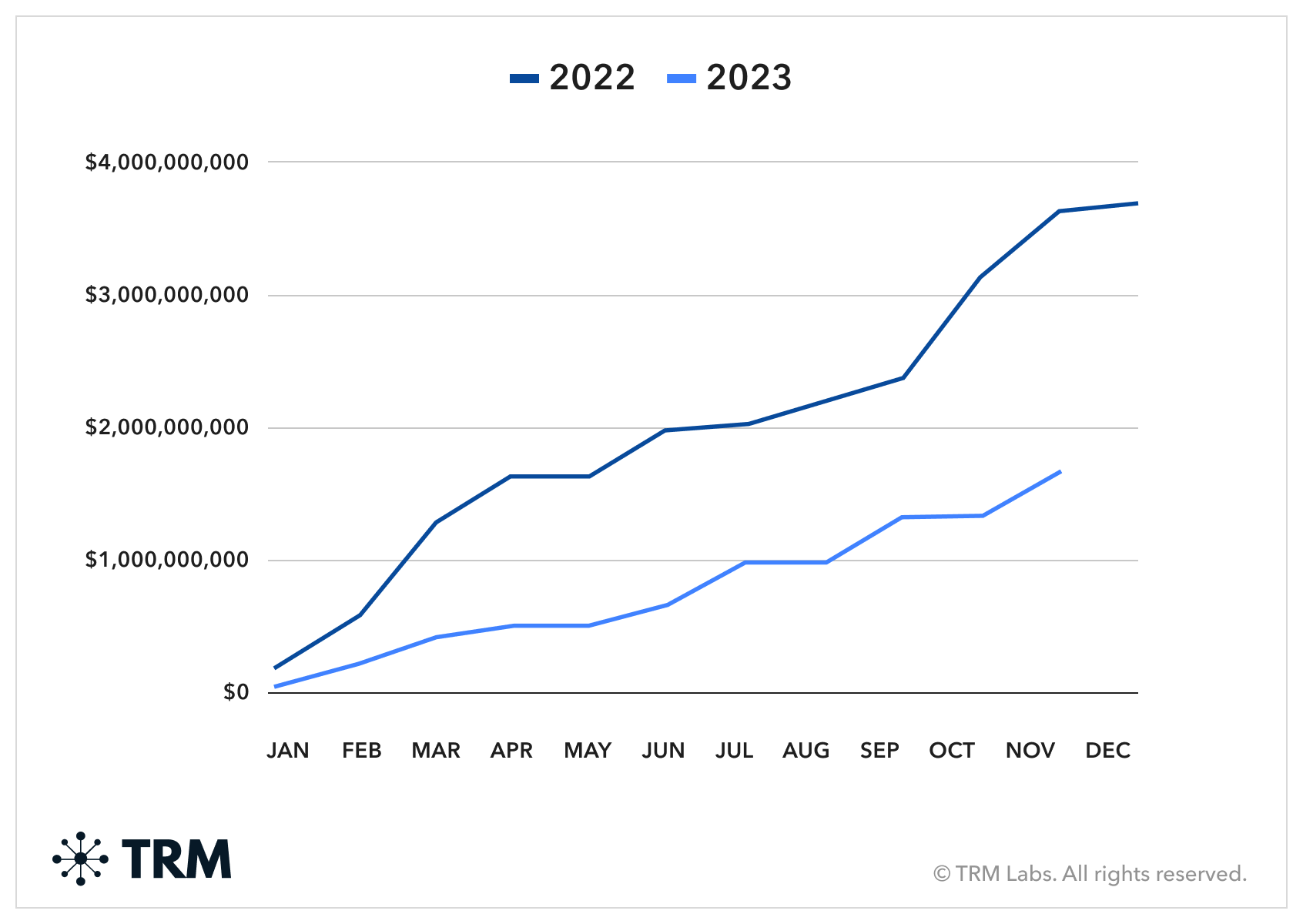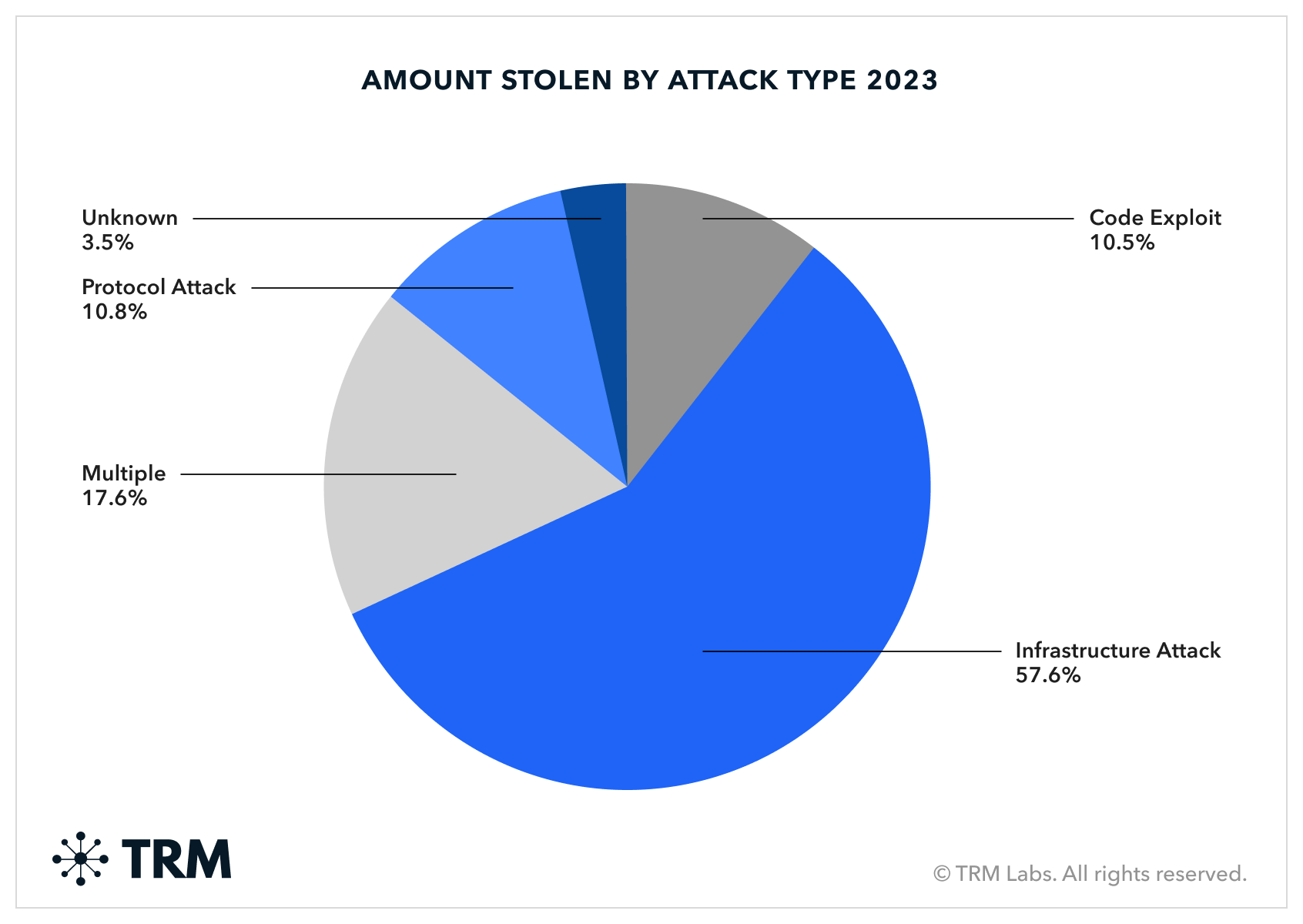There has been a significant drop in crypto hacks in 2023, with a more than 50% decrease compared to the previous year, according to research conducted by blockchain intelligence company TRM Labs.
While the number of hacking incidents remained relatively steady at 160, the total amount stolen by cybercriminals through November 2023 amounted to US$ 1.7 billion, less than half of the nearly US$ 4 billion lost to crypto hacks in 2022.

Cumulative Hack Volumes, 2023 vs. 2022 Source: TRM Labs
However, a few large-scale crypto hacks in December 2023 could potentially impact these figures, but the overall trend for the year is pointing towards a substantial reduction in hack-related losses.
Infrastructure attacks emerged as the primary mode of theft, comprising nearly 60% of the total amount stolen in 2023. Among these, private key thefts and seed phrase compromises were particularly damaging, allowing hackers to gain access to cryptocurrency systems’ fundamental infrastructure elements, such as servers, networks, or software, enabling them to steal funds or manipulate transactions.
These attacks averaged nearly US$ 30 million per incident, significantly higher than protocol attacks and code exploits, which collectively accounted for a fifth of all hacking incidents.

Source: TRM Labs
Similar to the previous year, a small number of major hacks were responsible for the majority of cryptocurrency thefts, with the top ten hacks representing almost 70% of all stolen funds.
Several of these breaches exceeded US$ 100 million, including attacks against Euler Finance (close to US$200 million in March), Multichain (July), Mixin Network (US$ 200 million in September), and Poloniex (over US$100 million in November).
Several factors are believed to have contributed to the decline in crypto hack volumes in 2023. Over the past year, the cryptocurrency industry has implemented robust security protocols, such as real-time transaction monitoring and anomaly detection systems. These measures bolster the security of digital wallets and exchange platforms, helping to identify and prevent potential security breaches.
Additionally, global law enforcement agencies have heightened their focus on cybercrime involving digital currencies. Enhanced collaboration among these agencies has led to faster responses to hacking incidents, facilitating the tracing, freezing, and recovery of stolen assets. This has deterred potential hackers by increasing the risk of detection and prosecution.
Cryptocurrency exchanges, wallet providers, and blockchain networks have also improved their sharing of information regarding vulnerabilities, threats, and breaches. This collective approach to security has created a united front against cybercriminals, making it more challenging for hackers to exploit systemic weaknesses.
TRM Labs said,
“Despite the encouraging news, the hacks landscape remains rapidly evolving and inherently uncertain: the emergence of a new sophisticated threat could quickly reverse the decline in hack volumes. Vigilance and adaptability remain crucial as the industry and law enforcement attempt to maintain this positive trajectory into 2024.”
Featured image credit: Edited from Freepik
- SEO Powered Content & PR Distribution. Get Amplified Today.
- PlatoData.Network Vertical Generative Ai. Empower Yourself. Access Here.
- PlatoAiStream. Web3 Intelligence. Knowledge Amplified. Access Here.
- PlatoESG. Carbon, CleanTech, Energy, Environment, Solar, Waste Management. Access Here.
- PlatoHealth. Biotech and Clinical Trials Intelligence. Access Here.
- Source: https://fintechnews.sg/82261/crypto/crypto-hack-volumes-slashed-by-50-in-2023-says-trm-labs/
- :has
- :is
- 1
- 100
- 160
- 200
- 2022
- 2023
- 2024
- 30
- 33
- 500
- 600
- 7
- 9
- a
- access
- According
- accounted
- against
- agencies
- AI
- All
- Allowing
- almost
- also
- among
- amount
- and
- anomaly detection
- approach
- ARE
- AS
- Assets
- At
- Attacks
- attempt
- been
- begin
- believed
- Billion
- blockchain
- Blockchain networks
- bolster
- breaches
- but
- by
- caps
- challenging
- Close
- code
- Coindesk
- collaboration
- Collective
- collectively
- company
- compared
- comprising
- conducted
- content
- contributed
- could
- created
- credit
- crucial
- crypto
- Crypto Hack
- crypto hacks
- cryptocurrency
- Cryptocurrency Industry
- currencies
- cybercrime
- cybercriminals
- damaging
- December
- Decline
- decrease
- Detection
- digital
- digital currencies
- digital wallets
- Drop
- elements
- emerged
- emergence
- enabling
- encouraging
- end
- enforcement
- enhanced
- evolving
- exceeded
- exchange
- Exchanges
- Exploit
- exploits
- facilitating
- factors
- faster
- few
- Figures
- finance
- fintech
- Focus
- For
- form
- Freezing
- from
- front
- fundamental
- funds
- Gain
- Global
- hack
- hackers
- hacking
- hacks
- Half
- Have
- heightened
- helping
- High
- higher
- hottest
- HTML
- HTTPS
- identify
- image
- Impact
- implemented
- improved
- in
- incident
- Including
- increasing
- industry
- information
- Infrastructure
- inherently
- Intelligence
- into
- involving
- IT
- jpg
- July
- Key
- Labs
- landscape
- large-scale
- Law
- law enforcement
- Led
- less
- losses
- lost
- mailchimp
- maintain
- major
- Majority
- Making
- March
- max-width
- measures
- million
- Mode
- monitoring
- Month
- more
- nearly
- network
- networks
- New
- news
- November
- number
- of
- on
- once
- or
- over
- overall
- particularly
- past
- per
- Platforms
- plato
- Plato Data Intelligence
- PlatoData
- positive
- potential
- potentially
- prevent
- previous
- primary
- private
- Private Key
- PROSECUTION
- protocol
- protocols
- providers
- quickly
- rapidly
- real-time
- recovery
- reduction
- regarding
- relatively
- remain
- remained
- remains
- representing
- responses
- responsible
- reverse
- Risk
- robust
- Said
- says
- security
- security breaches
- seed
- seed phrase
- September
- Servers
- sharing
- significant
- significantly
- Singapore
- small
- Software
- sophisticated
- Source
- steady
- stolen
- stolen funds
- substantial
- such
- systemic
- Systems
- ten
- than
- The
- theft
- thefts
- their
- Them
- These
- this
- threat
- threats
- Through
- to
- top
- Top Ten
- Total
- towards
- Tracing
- trajectory
- transaction
- Transactions
- Trend
- Uncertain
- United
- US$100 million
- vigilance
- volumes
- vs
- Vulnerabilities
- Wallet
- Wallets
- were
- which
- with
- Yahoo
- year
- Your
- zephyrnet














